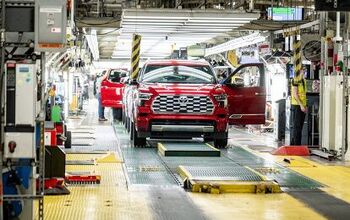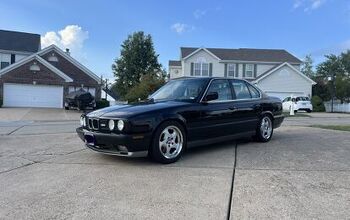China's Car Sales In September, Official Edition: Up 19.3 Percent

We knew that something was wrong with this month’s whisper number for Chinese car sales. If China’s largest carmaker, SAIC, improves by 23 percent , if Dongfeng is up 22.3 percent, then the total number will be somewhere in that neighborhood, and not “up by nearly 40 per cent over September 2009,” as it was rumored yesterday (no wonder we couldn’t find the official Xinhua release, it either had been withdrawn or it was never there.)
Now for the official number: Wholesale deliveries of passenger cars rose 19.3 percent to 1.21 million, the China Association of Automobile Manufacturers told Bloomberg in an e- mailed statement today. Total vehicle purchases in China, including trucks and buses, are up 17 percent to 1.56 million units, CAAM data say. When looking at these (for China) benign numbers, one has to keep in mind that in September 2009, sales of passenger vehicles had skyrocketed by 84 percentl all vehicles had been up 78 percent. Double digit growth on top of that is absolutely phenomenal.
For the first nine months, sales of domestically-made automobiles in China totaled 13.13m units, up 35.97 percent. Output was 13.08m units, up 36.1 percent, the CAAM says. To reach the 17m target for the year, the market must be up by around 25 percent, which now appears as entirely doable.
China’s top 10 reported sales of 11.3 million units for the first nine months, that’s 86 percent of the market. The remaining 14 percent are divided amongst 50 – 110 automakers, nobody knows for sure how many there are. Some companies are licensed carmakers, but don’t make cars, which is one of the reasons for the ongoing confusion.
Here are the nine month sales of the Top 10 in China. These numbers include the joint ventures held by the individual companies, for instance, SAIC includes GM and Volkswagen.
MakerSales (million)SAIC2.6500Dongfeng1.9000FAW1.8500Changan1.7200BAIC1.1000Geely0.5325Chery0.4753BYD0.3862Brilliance0.3758JAC0.3500Source: CAAMChina is a market no big company can be without. Volkswagen just announced that in the first none months, 1.47m VWs were sold in China, a plus of 39 percent, a bit ahead of the market, Automobilwoche [sub] reports. GM’s sales in China for the first nine months of the year totaled 1,775,764 units, an increase of 37.4 percent from the first three quarters of 2009 . However, the big number (wisely not broken out in the release) is Wuling vans, and they are suddenly not doing so well. On a brand basis, Volkswagen rules China.

Bertel Schmitt comes back to journalism after taking a 35 year break in advertising and marketing. He ran and owned advertising agencies in Duesseldorf, Germany, and New York City. Volkswagen A.G. was Bertel's most important corporate account. Schmitt's advertising and marketing career touched many corners of the industry with a special focus on automotive products and services. Since 2004, he lives in Japan and China with his wife <a href="http://www.tomokoandbertel.com"> Tomoko </a>. Bertel Schmitt is a founding board member of the <a href="http://www.offshoresuperseries.com"> Offshore Super Series </a>, an American offshore powerboat racing organization. He is co-owner of the racing team Typhoon.
More by Bertel Schmitt
Latest Car Reviews
Read moreLatest Product Reviews
Read moreRecent Comments
- Formula m How many Hyundai and Kia’s do not have the original engine block it left the factory with 10yrs prior?
- 1995 SC I will say that year 29 has been a little spendy on my car (Motor Mounts, Injectors and a Supercharger Service since it had to come off for the injectors, ABS Pump and the tool to cycle the valves to bleed the system, Front Calipers, rear pinion seal, transmission service with a new pan that has a drain, a gaggle of capacitors to fix the ride control module and a replacement amplifier for the stereo. Still needs an exhaust manifold gasket. The front end got serviced in year 28. On the plus side blank cassettes are increasingly easy to find so I have a solid collection of 90 minute playlists.
- MaintenanceCosts My own experiences with, well, maintenance costs:Chevy Bolt, ownership from new to 4.5 years, ~$400*Toyota Highlander Hybrid, ownership from 3.5 to 8 years, ~$2400BMW 335i Convertible, ownership from 11.5 to 13 years, ~$1200Acura Legend, ownership from 20 to 29 years, ~$11,500***Includes a new 12V battery and a set of wiper blades. In fairness, bigger bills for coolant and tire replacement are coming in year 5.**Includes replacement of all rubber parts, rebuild of entire suspension and steering system, and conversion of car to OEM 16" wheel set, among other things
- Jeff Tesla should not be allowed to call its system Full Self-Driving. Very dangerous and misleading.
- Slavuta America, the evil totalitarian police state

































Comments
Join the conversation
I'm not a China expert, but my guess is that typical Mercedes owner in China wouldn't be concerned at all when the world oil price reaches $150 a barrel - if it weren't for shortages. The first problem is refining capacity. The second problem is refining motor fuels profitably. What happens in China is that the state sets the street price of these fuels, especially diesel. When the costs of the raw material exceeds the mandated price of the refined fuel, as will be the case oil breaks a certain price barrier - then refineries essentially don't have an incentive to increase capacity.
Some analysis of the "miracle" that is the unending double-digit Chinese GDP reports that a significant number of new auto sales are ending up being literally warehoused....central planning's idea of keeping the engine running, along with massive public-sector infrastructure projects. So maybe it's all unsustainable (now that would be novel!) and projections of 40 million, let alone 75 million annual sales are just so much dreaming.